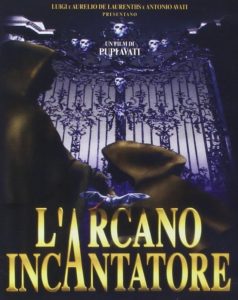 Nineties-era period horror from Italy that was underrated then but is overrated now. Written and directed by the prolific Pupi Avati, it’s a stately and atmospheric effort that nearly attains the heights of Avati’s previous horror classics THE HOUSE WITH LAUGHING WINDOWS and ZEDER.
Nineties-era period horror from Italy that was underrated then but is overrated now. Written and directed by the prolific Pupi Avati, it’s a stately and atmospheric effort that nearly attains the heights of Avati’s previous horror classics THE HOUSE WITH LAUGHING WINDOWS and ZEDER.
Pupi Avati has directed a variety of films ranging from screwball comedy to romance to straight drama, but it’s his horror movies, I’d argue, that have made the greatest impact, particularly THE HOUSE WITH THE LAUGHING WINDOWS from 1976 and 1983’s ZEDER: VOICES FROM BEYOND. THE ARCANE SORCERER (L’ARCANO INCANTATORE) bowed unsuccessfully in 1996, but has amassed a substantial cult following in the last few years, spearheaded by the filmmakers Guillermo del Toro, who raved about it at some length (in the 2013 anthology THE BEST FILM YOU’VE NEVER SEEN), and Edgar Wright, who called it “the BARRY LYNDON of horror movies.” That hasn’t helped its chances on the marketplace, however, as THE ARCANE SORCERER remains obscure, never having been commercially released (in any format) outside Europe.
16th Century Italy: Giacomo, a seminary student, claims to be possessed by Satan. Summoned to confess his sins, he tells one of his church superiors of how years earlier he was under indictment for defiling a young woman…
For that crime he’s obliged to leave his home and, through a series of odd and supernaturally tinged circumstances, Giacomo becomes the apprentice of the mysterious Arcane Sorcerer. This sorcerer is a former monsignor who was excommunicated for dabbling in sorcery. He’s located in a secluded mansion, where he’s looking to resurrect a deceased colleague through black magic. The Arcane Sorcerer tells Giacomo it’s not sorcery but a form of poetry that he practices, and that the mansion is suffused with ghosts that have haunted him since childhood.
One day Giacomo spots two young nuns in the grounds surrounding the mansion who immediately disappear. He becomes convinced that the nuns are the ghosts of two girls who vanished from a nearby convent years earlier, apparently at the hands of the Arcane Sorcerer. The latter’s unsavory activities are confirmed by a priest who accosts Giacomo in the mansion; the priest has apparently been spying on the place, and wants to use Giacomo to help prove the Arcane Sorcerer’s guilt.
But the Arcane Sorcerer is about to perform his latest and most audacious feat: getting in touch with the mansion’s ghosts directly by submerging himself in ice and slicing open a vein, which will apparently bring him closer to the spirit world. Giacomo is instructed to wake the sorcerer up before he expires fully. The results of this gambit are most instructive, and horrific…
Much like Pupi Avati’s previous genre films, THE ARCANE SORCERER is extremely low key and suggestive in its approach. Deliberately paced and lacking in gore, it often plays more like a dark period drama than a proper horror movie, albeit one with an atmosphere of profound ugliness and morbidity. It also, unfortunately enough, contains some truly rotten special effects, including a ridiculous Muppet bat featured prominently in one scene and a poorly animated “ghost” that figures in another. That latter depiction is especially unfortunate, as it ruins an otherwise impeccably executed scene of atmospheric horror.
Narratively speaking the term Arcane is appropriate, as the story pivots on religious and occult esoterica that will be incomprehensible to most viewers, and has a needlessly enigmatic ending (the likely reason the film has gotten so little play in the US).
Yet Pupi Avati’s talent for evoking chills through subtle means is in full evidence. A particularly inspired touch involves a ringing sound made by a finger moved around the rim of a wine glass—a ringing that continues after the finger is removed. Also, the film boasts excellent production design that sumptuously evokes a 16th Century milieu of sorcery and superstition, and nearly compensates for the acting, which is so-so at best.
Vital Statistics
THE ARCANE SORCERER
Duea Film/Filmauro
Director: Pupi Avati
Producers: Antonio Avati, Aurelio De Laurentiis
Screenplay: Pupi Avati
Cinematography: Cesare Bastelli
Editing: Almedeo Salfa
Cast: Carlo Cecci, Stefano Dionisi, Arnaldo Ninchi, Andrea Scorzoni, Consuelo Ferrara, Renzo Rinaldi, Massimo Sarchielli, Saverio Lagana, Clelia Bernacchi, Imelde Marani, Linda Gucciardo, Elena De Chirico
